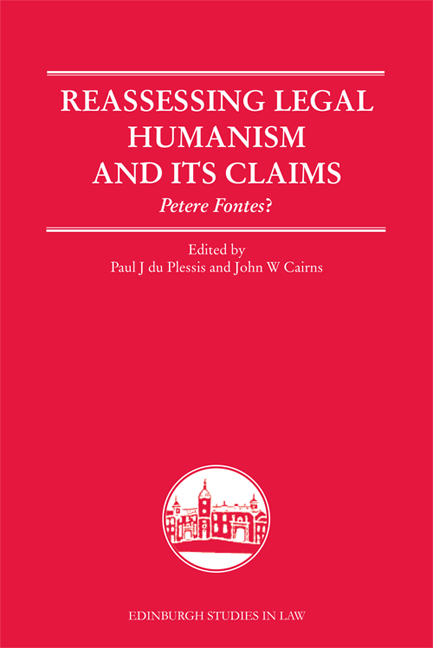Book contents
- Frontmatter
- Contents
- Preface
- A Note on Names and Book Titles
- List of Contributors
- List of Abbreviations
- Introduction
- Part I DEFINING LEGAL HUMANISM
- 1 Antiqui et Recentiores: Alberico Gentili–Beyond Mos Italicus and Legal Humanism
- 2 Humanist Philology and the Text of Justinian's Digest
- Part II A BREAK WITH THE PAST/CONTEMPORARY CRITIQUES
- Part III LEGAL HUMANISM: A PAN-EUROPEAN METHODOLOGY?
- Part IV LEGAL HUMANISM AND THE BOOK TRADE
- Postscript
- Index
1 - Antiqui et Recentiores: Alberico Gentili–Beyond Mos Italicus and Legal Humanism
from Part I - DEFINING LEGAL HUMANISM
Published online by Cambridge University Press: 05 September 2016
- Frontmatter
- Contents
- Preface
- A Note on Names and Book Titles
- List of Contributors
- List of Abbreviations
- Introduction
- Part I DEFINING LEGAL HUMANISM
- 1 Antiqui et Recentiores: Alberico Gentili–Beyond Mos Italicus and Legal Humanism
- 2 Humanist Philology and the Text of Justinian's Digest
- Part II A BREAK WITH THE PAST/CONTEMPORARY CRITIQUES
- Part III LEGAL HUMANISM: A PAN-EUROPEAN METHODOLOGY?
- Part IV LEGAL HUMANISM AND THE BOOK TRADE
- Postscript
- Index
Summary
A. INTRODUCTION
B. LEGAL HUMANISM: A CONVENTIONAL AND CONTROVERSIAL HISTORIOGRAPHICAL CATEGORY
C. ALBERICO GENTILI: A CIVIL LAWYER's COMMITMENT TO SCHOLARSHIP, PUBLIC GOVERNANCE AND INTERNATIONAL RELATIONS
D. DE ARMIS ROMANIS
(1)Structure
(2)Methods of argumentation
(3)Legal arguments
(4)Legal analogies
(5)The central theme: just wars and good governance through laws
(6)Public governance: no “Celestial Jerusalem”
E. CONCLUSIONS
INTRODUCTION
Legal humanism is a recurrent, and therefore apparently well-established category in many textbooks on legal history. For many generations it has been a distinct topic that has inspired a substantial body of scholarly literature. Especially (but not only) for the sixteenth century, it is a more or less conventional (and convenient) term used for pigeonholing any particular author or work in a broader context of doctrinal currents. Consensus among scholars about the defining features of legal humanism remains nonetheless relative. One may probably recognise a degree of consensus on some characteristics, authors and works, which are all widely accepted as representative of legal humanism, but beyond a perhaps comparatively small core of those characteristics, authors and works– if Agustín and Cujas are not acknowledged as legal humanists, who will be?– legal historians vary and disagree– sometimes about details, sometimes about more fundamental issues– when it comes to labelling a jurist, a law book or a legal reasoning as expressing legal humanism. In the present contribution, I shall confine myself to both a very general and a fairly restrictive definition of legal humanism, which, moreover, does not even provide me with a sufficiently precise tool for establishing, within flexible parameters, what may or may not be regarded as an expression of legal humanism. The purpose of that definition is merely to provide a provisional backdrop for a more specific case study, which will be focused on Alberico Gentili's De armis romanis. In recent decades, Gentilian studies have produced a considerable amount of scholarly publications, produced fresh materials and perspectives, and undergone different shifts in their various interpretations. The blunt tool of my non-comprehensive definition of legal humanism may at least contribute to raising some issues about any assessment of Gentili's writings.
- Type
- Chapter
- Information
- Reassessing Legal Humanism and its ClaimsPetere Fontes?, pp. 11 - 40Publisher: Edinburgh University PressPrint publication year: 2015



